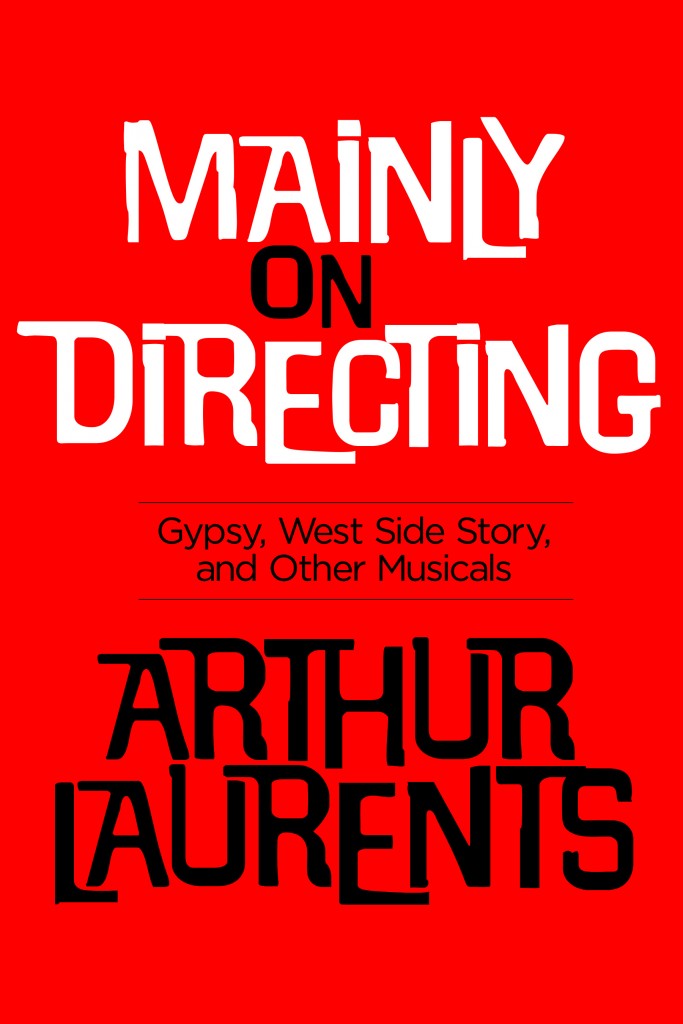Mainly on Directing—Gypsy, West Side Story and Other Musicals
By Arthur Laurents (Applause Theatre & Cinema Books, 2014)
Arthur Laurents did so much for so long that it took two volumes of autobiography to cover just the stuff he wrote: West Side Story, Anyone Can Whistle, Gypsy, Time of the Cuckoo, Nick & Nora…
But Laurents was also, to a lesser extent, a director, and between the stories he can tell about directing his own work and the complaints he can make about other people directing his own work, that’s a third volume right there.
Mainly on Directing has just been granted this handy Applause paperback edition, five years after the hardcover edition was published and three years after Laurents died in 2011 at the age of 93.
This is a book that wants to set the record straight. Whatever the issues are that people had with Laurents’ directing projects—most of which got mixed reviews at best and a couple of which were legendary flops—Laurents needs you to know that they weren’t his fault. He knew what these shows were really ABOUT. But the producers or casts or designers wouldn’t believe him.
Once you hack away all the defensive self-justifications, this is a useful book about the director’s craft, written by someone who can articulate it better than many great directors could.
Sure, there are some inexplicably sappy and shallow bits (“There was one factor above all others that made this Gypsy extraordinary. Roll your eyes if you will, but the production was driven by love”), but mostly there are unique insights into the creative process at the highest levels of Broadway showmaking. Laurents worked with composers such as Stephen Sondheim and Jerry Herman, choreographers such as Jerome Robbins, producers such as David Merrick, stage directors such as Sam Mendes, film directors such as Alfred Hitchcock (though he’s not discussed in this book, which focuses on stage musicals) and stars such as Rita Moreno and Bernadette Peters and Angela Lansbury and Patti Lupone and Barbra Streisand.
There’s some dishing about those celebrities and others, but it’s not really dishing because most of the stories have a point. Laurents may foam at the mouth because his collaborators occasionally don’t trust his instincts, but he clearly respects their work styles and tastes even when they differ greatly from his own. This is a book with a lot of qualifying clauses:
A number like ‘Rose’s Turn’ is so strongly written, and Bernadette Peters is so strong a performer, that the audience applauded and cheered even though it wasn’t getting full value: the star wasn’t delivering that landmark number as brilliantly in her own original style as she undoubtedly could.
As backhanded compliments go, that one’s pretty darn fronthand complimentary.
There are also some massive shrugs, as Laurents bemoans the state of theater that knows what it can get away with and doesn’t settle for better:
No one asks why Antonio Banderas was cast in a revival of Nine. As expected, the box-office advance was good. Unexpected were the rave reviews and the wildly enthusiastic audience, both sending the box office skyward. Banderas was completely at home on the stage; his charm was enormous; he was the matinee idol of the twenty-first century; and the company—of women—adored him. If 8 1/2, on which Nine was based, was about a man of genius, and for all that Banderas was, that he was not, did it matter? How faithful was the musical to the film, anyway>
The real questions were: What was the purpose of the production? Why was Nine revived? Did the director want more than gaudy success? Did he have higher aspirations? Did the authors?
In this theatre, why ask? The show was a success.
It’s tempting to say that Arthur Laurents missed his true calling as a critic or professor, but duh, no, ‘cause he wrote West Side Story and Gypsy. It’s great to read a book that still feels current (Laurents’ West Side Story revival only just stopped touring this past June) but doesn’t pull any punches. Laurents had the power and the stature to call ‘em as he saw ‘em—even if he does sometimes pull those punches for some good old ego-stroking.

